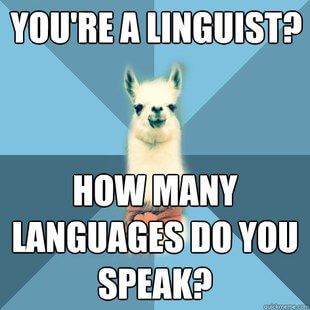As soon as you tell someone you’re a linguistics major, the first question they’ll ask is, “How many languages do you speak?” But linguistics isn’t about learning multiple languages; instead of studying languages widely, you study them deeply. While technically a humanities major, linguistics is the science of language. Once you’re immersed in the major, you’ll see just how scientific it is. It’s almost like math, but words and sentences are the problems you’re trying to solve.
What You’ll Be Doing

Linguists strive to model how humans learn, use and understand language. programs across the country require an intro course, as well as syntax and phonology, two of the largest linguistic categories. Syntax is the study of sentence structure, while phonology is the study of sound structure. After these basic requirements, you make your choice of two paths: a general grammar and cognition track, or a language track. The general track focuses on English and requires many linguistics courses, such as psychology and philosophy, while the language track requires the basics as well as the study of a language of your choice. You’ll also have your pick of countless electives, including psycholinguistics and research studies.
Upsides

1. “The upside of pursuing a linguistics major is that it’s interesting but not overwhelming. It’s a taster of sorts. You’ll be in the classroom with some very smart, awesome nerds.” – Katya Rozanova, University of Maryland Class of 2007, Graphic Design
2. “A good grasp of rules and syntax makes for great writers, which is very important for attorneys.” – Ariella Cohen, University of Maryland Class of 2011, Law Student
3. “Learning to recognize similarities in languages makes me feel more connected to people.” – Stacey Maresco, University of Maryland Class of 2011, International Development
Downsides

1. “The downside of pursuing a linguistics major is that you’re unlikely to use it unless you decide to continue on to grad school.” – Katya Rozanova, University of Maryland Class of 2007, Graphic Design
2. “I think because it’s often a BA, which it is at UMD, people don’t anticipate that it will actually be as difficult as it truly is. I think lay people just have no idea what it is, so they have no idea what to expect and thus have no reference point for understand how much respect linguistics and linguists deserve.”– Ariella Cohen, University of Maryland Class of 2011, Law Student
3. “When you graduate it’s difficult to convince employers that your skills transfer to other fields because most people don’t know what it is that linguists do.” – Stacey Maresco, University of Maryland Class of 2011, International Development
Career Opportunities

Yes, there are actually careers in the field of linguistics; tell your grandma to stop worrying. Whether you stick with a bachelor’s or go on to earn a higher degree, you’ll find a position that puts your skills to the test.
Academia & Research
Most of the research done in the linguistics field is done on college campuses by researchers who double as professors, sharing their knowledge with the student body. You’ll need a Ph.D, of course, but once you have it, you’ll be able to teach at a number of acclaimed universities and pursue your research goals and curiosities.
Center for Applied Linguistics
CAL’s mission is to promote language learning by providing research and other resources for people trying to learn languages, mainly foreign speakers learning English. While it offers countless departments for people with backgrounds in linguistics, quantitative research assistant may be the most relevant position. As an assistant, you’ll provide research support on projects, including data collection and analysis, literature searches and report preparation.
Government (Departments of Defense, State, Justice)
While these jobs often require you to know other languages, you’ll still be putting your linguistic knowledge to the test. Organizations like the FBI and CIA hire linguists in counterterrorism units, often to decipher and translate foreign languages spoken in remote areas.
Education
A large number of graduates with linguistics degrees also pursue degrees in education. Knowledge of the science of language can be a solid foundation for any job, including teaching. Skills like pattern recognition and problem solving prove especially useful when decoding the ramblings of angry first graders.
Language Technology
Software and computer companies like Google, Microsoft and IBM need linguists in the language technology field. Linguists help develop software that can listen and speak to users (like Siri), using their linguistic knowledge to make computers and their users speak the “same language.” You’ll examine data and use it to help computer scientists create more user friendly programs.



















